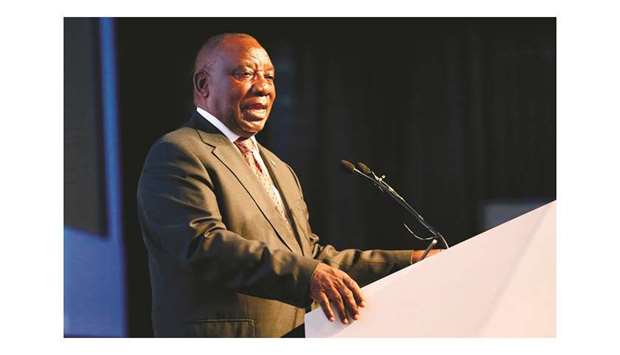The African National Congress easily won South Africa’s general election but its share of the vote fell, reflecting anger at corruption scandals and racial inequalities that remain entrenched a generation after the party took power.
The turnout for Wednesday’s vote was markedly lower than at the last election in 2014, falling to 66% from 73.5%, the electoral commission said, while the main opposition party, the Democratic Alliance (DA), also saw its vote share fall.
ANC Deputy Secretary-General Jessie Duarte said “confidence is returning and we need to correct our mistakes”. Other ANC officials had already acknowledged the decline in support compared with five years ago.
Provisional results yesterday showed the ANC secured 57.51% of the parliamentary vote.
The DA picked up 20.76% and the leftist Economic Freedom Fighters took 10.79%, the Independent Electoral Commission said on its website.
The DA’s communications director Mabine Seabe said the party viewed the outcome as “a positive result. We’ve grown in communities we’ve never grown before”. EFF officials could not be reached for comment.
The ANC’s victory secures it enough seats in parliament to give President Cyril Ramaphosa another five years in office but may leave him short of ammunition to battle party rivals who oppose his reforms to galvanise the economy and counter graft.
It was the worst electoral performance by the late Nelson Mandela’s former liberation movement, which has governed South Africa uninterrupted since the country’s first free election marked the end of white minority rule in 1994.
The ANC had not previously won less than 60% of the vote in a national poll.
In 2014, it won 62% of votes, the DA 22% and the EFF 6%. Election officials said voting was generally smooth.
But 27 smaller parties of 48 that ran in total alleged irregularities and threatened legal action, which the electoral commission said it would oppose.
Ramaphosa had sought to re-engage voters whose enthusiasm for the ANC has been eroded by its faltering efforts to address corruption, high unemployment and persistent racial disparities in housing, services and land distribution.
Africa’s most advanced economy remains one of the most unequal societies in the world, according to the World Bank.
The ruling party retained control of eight of South Africa’s nine provinces in separate elections also held on Wednesday, with the DA keeping hold of the Western Cape, home to Cape Town, where parliament resides.
Analysts had said a poor showing by the ANC would embolden opponents of Ramaphosa and risk a challenge to his leadership.
Fikile Mbalula, a former cabinet minister who was in charge of the ANC’s election campaign, said its 10mn votes were the result of hard work by its leadership.
He hailed union leader turned business tycoon Ramaphosa’s role in starting to undo negative public perceptions.
“People love him,” Mbalula said. “And from where we were, we were battered in terms of our image and he was a game-changer for the ANC.”
The 66-year-old president was “very safe” from internal challenges, he said, adding: “The ANC is very strong in protecting their leadership.
Even if there are remnants trying their thing, they will not succeed.”
The ANC achieved its best parliamentary election result in 2004 under former president Thabo Mbeki, when it won 69% of the vote.
But its support fell under Zuma, and it lost control of big cities like the commercial capital Johannesburg in local government elections in 2016.
Election analyst Wayne Sussman said the DA lost votes to the conservative Freedom Front party, which capitalised on plans to allow land expropriation without compensation.
Whites, just 9% of the 56mn population, still own more than 70% of agricultural land.
“The DA wasn’t speaking enough about safety for farmers and agriculture for some voters,” Sussman said.
The Freedom Front, which says it aims to protect Afrikaners’ interests, campaigned under the slogan “fight back”.

South African President Cyril Ramaphosa speaks during the formal announcement of the National and Provincial Election Results at the Independent Electoral Commission (IEC) Results Operations Centre in Pretoria, yesterday.
